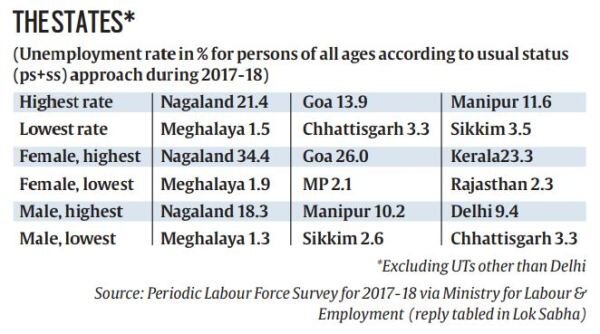Indian Economy
State Divide in Unemployment
- 26 Jun 2019
- 4 min read
The Periodic Labour Force Survey (PLFS) for 2017-18 reflects huge variations among the states in terms of the unemployment rate. The survey reflects the overall unemployment rate in India at 6.1%.
- Nagaland and Meghalaya occupy the top and bottom positions among all states in terms of the unemployment rate at 21.4% and 1.5% respectively.
- In terms of Rural-Urban divide, urban areas are facing a high rate of unemployment (7.8%) in comparison to rural areas (5.3%).
- The unemployment rate among rural males (5.8%) is higher than that of females (3.8%), while for urban areas the phenomena reverses with the unemployment rate among females (10.8%) higher than that of males (7.1%).
- The unemployment rate among females has been observed lower than the males with 5.7% and 6.2% respectively.
- Goa and Kerala are high in female unemployment with a rate of 26% and 23.3% respectively. Meghalaya is at the bottom with 1.9%.
Periodic Labour Force Survey (PLFS)
- The Periodic Labour Force Survey (PLFS) was launched by the National Sample Survey Organisation (NSSO) in 2017.
- The objective of PLFS is primarily on two aspects:
- The first is to measure the dynamics in labour force participation and employment status in the short time interval of three months for the urban areas only in the Current Weekly Status (CWS).
- Thus, in every quarter, PLFS will bring out the level and change estimates of the key labour force indicators in CWS viz. Worker- Population Ratio (WPR), Labour Force Participation Rate (LFPR), Unemployment Rate (UR).
- Secondly, for both rural and urban areas, level estimates of all important parameters in both usual status and CWS will be brought out annually.
Key Employment and Unemployment Indicators
- Labour Force Participation Rate (LFPR): LFPR is defined as the percentage of persons in the labour force (i.e. working or seeking or available for work) in the population.
- Worker Population Ratio (WPR): WPR is defined as the percentage of employed persons in the population.
- Proportion Unemployed (PU): It is defined as the percentage of persons unemployed in the population.
- Unemployment Rate (UR): The unemployment rate is calculated by dividing the number of unemployed by the number in the labour forces, that is, the sum of employed and unemployed.
- Activity Status- Usual Status: The activity status of a person is determined on the basis of the activities pursued by the person during the specified reference period. When the activity status is determined on the basis of the reference period of the last 365 days preceding the date of survey, it is known as the usual activity status of the person.
- Usual Principal Status and Subsidiary Status (PS+SS): The Usual Principal Status and Subsidiary Status approach is an extension to the principal status approach.
- If a person has engaged in any economic activity for a period of 30 days or more during the preceding 365 days a person is considered as employed under this approach.
- Activity Status- Current Weekly Status (CWS): The activity status determined on the basis of a reference period of last 7 days preceding the date of the survey is known as the current weekly status (CWS) of the person.





